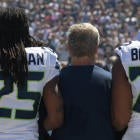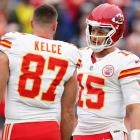There have been a large number of NFL players to take a knee or hold up a fist during the national anthem prior to NFL games this season, with Colin Kaepernick leading the way during the preseason and the protests rapidly expanding to multiple teams in the regular season.
Each passing game sees someone new join. But thus far the NFL has only featured African-American players, something Seahawks defensive end Michael Bennett noticed. Bennett believes it's "super important" for a "white guy" to jump on board.
"You need a white guy to join the fight. The white guy is super important to the fight," Bennett said. "For people to really see social injustices, there must be someone from the other side of the race who recognizes the problem, because a lot of times if just one race says there's a problem, nobody is realistic about it."
There have been Caucasian athletes from other sports to join in on the protest, including soccer star Megan Rapinoe, who began taking a knee before the national anthem.
Bennett's teammate Cliff Avril even has a specific person in mind when it comes to the protest.
"If somebody like, say, Aaron Rodgers got behind us, I think it would touch home for a lot more people," Avril said. "At the same time, I see why they probably wouldn't, because they don't know what we're going through. That's one of those situations where it's unfortunate."
There is a major race factor at play in all of these protests. The poll numbers bear them out. A Seton Hall Sports poll provided to CBSSports.com shows a divide among racial lines for many. And an E-Poll study that found Kaepernick to be the "most disliked" player in the NFL had major racial divides in it as well.
It is also a subject that makes people uncomfortable in many cases, which is precisely what Seahawks kicker Steven Hauschka, a Caucasian, said in reaction to the protests.
"I think a lot of white people are uncomfortable talking about it," Hauschka said. "I don't want to speak for all white people, but I know for myself, I'm uncomfortable about the subject. There's a lot of racial tension that goes way back, and I don't know what it's like to be black in this country. I don't know how any white person could."






















